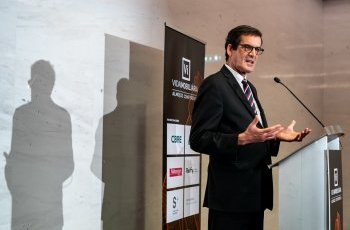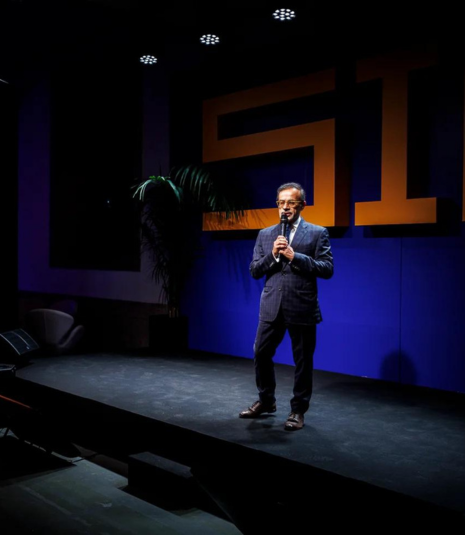Rui Moreira says that “credit is due to all” that the city is today “profoundly different”

Rui Moreira, Mayor of Porto assessed some of the most significant projects that have been developed in the city of Porto, throughout the past years, from urban rehabilitation to housing, through mobility, environment and sustainability, highlighting that this evolution is due to a "virtuous circle between public and private policies”. For each euro of public investment, "the multiplier effect varies between 20 to 30 euros of private investment”, the Mayor added.
The refurbishment and restoration of the Bolhão Market was another topic covered by Mayor Rui Moreira, during the panel moderated by António Gil Machado, director of Vida Imobiliária, in a room that was filled not only with professionals from the real estate sector, but also the councillor for Economy and Trade of Porto City Hall, Ricardo Valente.
"Here, we thought: let’s do it the other way around and have pure and simple municipal investment”, shared Rui Moreira, who also stated that the rehabilitation of the entire block enables to "create an anchor” that will boost urban regeneration in its enveloping area.
Thai is why, the Mayor advanced, one cannot look at the city with a "closed ideological perspective”, "of a Left that demonises private investment and a certain Right Wing that demonises public investment”. "The only way a city can thrive is if i tis able to balance these two components, the private and the public”, Rui Moreira enthused.
According to Rui Moreira, today investors choose the city of Porto, not only for the traditional matters, but also valuing the "sustainability” factor. In this regard, the Mayor of Porto enhanced the importance of investment in such projects that promote soft modes, intelligent and sustainable mobility. "If we want to solve the excessive dependency on individual transport, we cannot do it by prohibiting it”; as such, the Mayor listed a set of investments that will shift the paradigm like the new metro lines, the metro-bus concept, which will be totally implemented at Avenida de Fernão de Magalhães, whose works are "almost completed”, or still the reactivation of the Ramal da Alfândega and the doubling of the Northern Railroad, which the Mayor is "certain” it will go forward.
Rui Moreira also referred the construction of the Terminal Intermodal de Campanhã and the intermunicipal undertaking of the STCP, "whose management is now ours, because we hold more than 50 per cent”. This "old ambition”, which goes back as 1948, costs "over eight million euros per year”, but the Mayor of Porto maintains that "wise spending” enable to bet in this type of investment (adding that the municipal company Águas do Porto will produce and supply energy and that there will be a reduction of the IMI tax values) and that, as the Mayor explained, allow for the reduction of the red tape costs, such as increasing the available income within the households, thus promoting the economic growth in the city.
As regards the environment, Rui Moreira highlighted the implementation and extension of projects door-to-door waste collection. "We are very near to reprocessing circa 30 to 35 per cent of our waste”. To achieve this goal, Mayor Rui Moreira said that the internalisation model of services was adamant, namely the creation of Porto Ambiente. "We spent four million euros less per year and the city is cleaner”, Rui Moreira declared.
Referring to housing, Rui Moreira suggests that it is necessary to provide housing at reasonable costs, but refuses "figures of speech”. In this regard, the Municipality must create the conditions so that the city does not develop as a single product, and that will only be possible "through the private sector”, affirms Rui Moreira. "We must be capable of challenging private investors to projects that pursue commitment with the City Hall, not by divestment, but by long term cession of public land”.
In addition, the Municipality will maintain its housing stock, Rui Moreira stated. "Porto does not need more social housing, what it needs is not having 13% in need of social housing and that is done by creating wealth and attracting investment”, claimed Rui Moreira, recalling that Porto is comparable to Finland in this regard, and that the national average is circa 2% (for 2025, the Government’s goal is to go up to 5%).
Regarding the role of culture when it comes to the city’s attractiveness, Rui Moreira considers that culture is "the cement”, because "a cultivated citizen creates trends” and won’t be easily assimilated, which is the reason why he does not fear gentrification, as it fits in the city’s balance, which, by definition, means that people are always coming and going.




